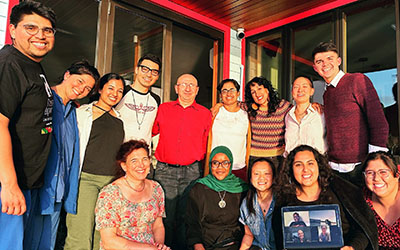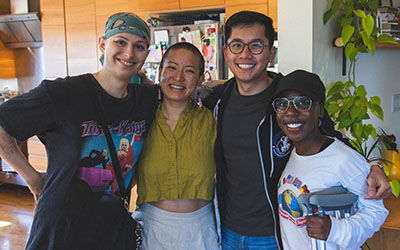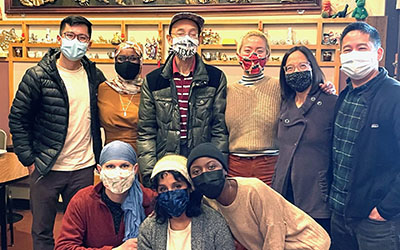Health Equity Track
Mission: To train a diverse group of pediatric residents to advance health equity for children and communities who are underserved and/or marginalized through collaborative clinical care, community partnership, advocacy, research and education.
The University of Washington/Seattle Children's Pediatric Residency Health Equity Track is designed to train the next generation of leaders and transformative thinkers in pediatric health equity across the clinical care spectrum.
There are four priorities of the HET:
- Critical engagement, education and training on a number of issues related to health equity, social justice and leadership
- Focused mentorship
- Protected time to work on a health equity project
- Community building

Throughout their three years of training, residents will have seven dedicated blocks to focus on growing skills to recognize the roots of health inequity and effectively strategize to mobilize resources and interventions to advance health equity and justice for our children, adolescents and communities. Residents in the Health Equity Track will develop meaningful work within their preferred area of focus, including, but not limited to legislative and other forms of advocacy, quality improvement, health-equity centered writing and reflection and community-engaged activism and research.
Residents will have the opportunity to partner and learn from leaders within the community as well as within academic medicine in their work and through a dedicated curriculum (1 block each year), longitudinal gatherings (4 per year) and individualized mentorship (with select HET faculty and other faculty engaged in health equity work across the institution). Emphasis will also be placed on personal growth and development, including opportunities for self-reflection, inquiry and exploration of personal histories and goals.
Some of the interests/work that our residents have engaged in are:
- Developing curricula to counter race-based medicine
- Partnering with gender diverse and unstably housed teens to improve their health outcomes
- Various community health projects with local refugee/immigrant community
- Bringing community organizing principles into clinic spaces
- Partnering with faculty to bring structured anti-racism mentorship to trainees
Why choose the Health Equity Track?
 You are interested in becoming a leader in the field of pediatric health equity and are seeking dedicated training in recognizing and addressing structural causes of health inequity, including the development of leadership and advocacy skills, formation of community partnerships, understanding how to mobilize resources to create effective change and becoming part of a community of pediatricians dedicated to advancing health justice.
You are interested in becoming a leader in the field of pediatric health equity and are seeking dedicated training in recognizing and addressing structural causes of health inequity, including the development of leadership and advocacy skills, formation of community partnerships, understanding how to mobilize resources to create effective change and becoming part of a community of pediatricians dedicated to advancing health justice.
You are interested in building inclusive partnerships with community members and organizations to advocate for communities that are furthest from health justice with a liberatory and anti-oppression lens.
You have lived experiences in health or other social inequities and you are motivated to reflect and build on your personal strengths to become a leading voice of change.
How will residents’ time be spent?
During the first year (R1), residents will have two months focused on building advocacy and clinical skills, developing community partnerships and learning strategies to develop and evaluate sustainable interventions for child health. One month per year (R1-3) will be dedicated to a curriculum block that aims to further develop necessary leadership, inquiry and narrative skills as well as to learn from community and academic experts on a number of topics. Central to this month is the building of community and the practice of solidarity among the residents and faculty of the track, as well as engagement with key leaders across Seattle and King County.

The second and third years (R2 and R3) focus on meaningful work and scholarship development and implementation. Residents will have three blocks of protected time with few clinical requirements each R2 and R3 to dedicate to this. As in our categorical program, our Health Equity Track residents will also participate in our WWAMI rotation during the R2 year.
Residents will also build their continuity clinic patient panels in partnership with Odessa Brown Children’s Clinic (OBCC), SeaMar Community Health Centers and the Pediatric Clinic at Harborview.
Due to curricular and time constraints, HET residents are not eligible to participate in other tracks or pathways within our training program, such as the REACH pathway.
How do I apply to the Health Equity Track?
As with the other individualized training tracks, the Health Equity Track residents will be firmly integrated within the categorical program and are a part of the larger family of the pediatric residency program.
Given the dedicated time allocated to community-based projects and skill building, there is a separate match number to apply to the Health Equity Track. To be considered for both the categorical program and the Health Equity Track, you must apply to each separately using their individual match numbers. See more details here.
Program Leadership
- Alissa Darden, MD, Residency Program Director, Primary Care Pediatrics
- Sabreen Akhter, DO, Director, Health Equity Track, Pediatric Emergency Medicine
- Anisa Ibrahim, MD, Site Director, Harborview Clinic, Primary Care Pediatrics
- Vaidehi Pidaparti, MD, Core Faculty, Primary Care Pediatrics
- Davia Loren, MD, Core Faculty, Care of Transgender/Gender Diverse Children
- Tracy Seimears, MD, M.Ed, Associate Program Director, Pediatric Hospitalist Medicine
- Phanith Touch, MD, Executive Resident
